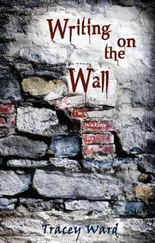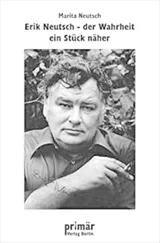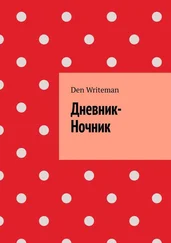The schoolroom was situated on the edge of a largish forest and as the days were getting warmer I applied and got permission to carry on our refresher course outdoors. The next day we carried a large table deep into the wood, followed by benches to sit on around it and presumably to discuss wireless problems. The four people not at the table were the lookouts and we all carried on from where we left off in the schoolroom, except most of us were stripped to the waist in order to get ourselves a healthy tan.
But too much of a good thing is more than enough or, to put it another way, we were all getting a bit cheesed off with our daily shirk. Lying out in a sun-dappled wood, writing home, reading, playing poker and throwing darts at a board tacked on to a tree may be all very well for an elderly coachload on a mystery tour, but as far as we were concerned there was a war on and again, why were we here? It was painfully obvious that the army had no idea why we had been tacked on to their ration strength; they’d obviously had no instructions from above and frankly I’m sure we were becoming a source of embarrassment. We were billeted with the soldiers, and in the evenings we had drinks with them in the local, but as far as the war was concerned we were strangers.
It was then that an idea came to me. It was daring and risky, but at least it would be positive. I went to see the army commanding officer. I was shown into his office immediately and straightaway I came to the point by asking him what exactly we were supposed to be doing attached to the Second Army. He threw up his hands and said, ‘I’m as much in the dark as you are,’ which came as no surprise, so I fired my first salvo by suggesting that we should be sent on leave.
He pondered this for a minute or two and I took the opportunity to leap in with a reason for requesting leave. I told him that we hadn’t been on leave for over six months. He was visibly taken aback by this and I wondered if I’d gone too far, because prior to our posting to Swaffham a few weeks ago I’d enjoyed seven days at home and I presumed that so had the rest of my lads. But I was worrying for nothing. The CO brightened and agreed that we should have leave; in fact I think he was glad to see the back of us for a week. The only stipulation he made was that we couldn’t all be absent together and we would have to go two at a time.
Game, set and match. Five minutes later I was breaking the good news to the lads, asserting that as I’d gone out on a limb for this leave I would be one of the first pairing, and the other lucky erk would be drawn out of a hat. Folding up the names, I put them into my glengarry, and with all the mob following I took it into the next hut and asked one of the squaddies to pick out a name. Holding the cap at arm’s length above my head, the army lad reached up and fumbled around and came out with a bit of paper, which I handed over to the nearest of our mob. Unfolding it, he read, ‘Hoppy Holden’. Immediately there were cries of ‘Fix’, ‘Stitch-up’ and ‘It’s a fiddle’, etc., because it was no secret that Hoppy and I were close mates. Then one of the lads blurted out, ‘All the pieces of paper have the name Hoppy Holden written on them,’ but when I upturned the cap on the bed they could see that this was not the case—it was perfectly legitimate. However, there was a trick in it. Inside our forage caps was a ridge and having had a few words with the army wallah, backed up with a packet of fags, I’d made sure that all the other names were on one side of the ridge and Hoppy’s name was on the other, et voilà !
When I walked into our house they wanted to know if I’d deserted as it was only a few weeks ago that I was on seven days’ leave, and to be quite honest the days dragged by. I was keen to get back to the rough and tumble of Swaffham. Sadly, when I returned all future leave was cancelled. There was a flap on and we were all issued with travel warrants for a place called Gatton Park just outside Reigate. Into my third year in the air force and although there were plenty of aircraft whizzing about the sky I had yet to see a plane on the ground, and I’d never even seen a WAAF.
From the bustling, busy little market town of Swaffham to the quiet gentility of Gatton Park—what a difference, what a contrast! As the lorry deposited me inside the gates, I was deeply moved by the rolling splendour. Perhaps I was dead and this was the first staging post to heaven. Acres of grassland surrounding a wood, stately trees from the saplings of Elizabethan days—I was enraptured. There wasn’t a tree in sight in the part of Oldham near Featherstall Road. Had there been one we would have been up and down it like a squirrel with its tail on fire. The centrepiece of Gatton Park was an elegant Georgian mansion and, just a few strides away, a private chapel, the whole bordered by shiny manicured lawns, and I couldn’t get over how green the grass was, a totally upper-class strain of the greyish blades sprouting from cracks in the Mucky Broos like the tufts of hair in an old man’s ear. For the moment a wave of nostalgia swept through me, but it was only a moment. I just stood by my kitbag, pack still on my back, lost in wonder as I took in a section of bright sparkling water almost hidden by the house.
The home of the Colman’s mustard family, Gatton Park, was their fiefdom. This I learned later from one of the estate workers who lived in a row of much humbler dwellings a discreet distance from the big house. This local, who turned out to be one of the gardeners, added. ‘Isn’t it amazing that all this splendour was built by the little bit of mustard you leave on the edge of your plate?’ This I didn’t understand. I’d never left a bit of mustard on the edge of my plate—in fact mustard and I had yet to be introduced.
With a sigh of content I accepted the fact that once again I’d fallen on my feet. Granted it wasn’t the operational flying station I had been eagerly expecting, but then again there were more things in life besides the war. I was shaken out of my reverie when a voice yelled ‘That man there.’ I whirled round to see a sergeant beckoning to me. He was with a group of new intakes, milling around, kitbags at their feet, packs still not offloaded. To me they were all strangers and to each other, the only thing we had in common being the badge sewn on to the sleeve of our uniform of a fist clutching bolts of lightning denoting that we were all wireless operators.
After a meal, which would be better described as iron rations, suggesting that the cooks were new as well and didn’t yet know where everything was, the sergeant led us down to a row of tents by the side of one of the roads. Eight of us were allotted to each one. It was only when we crouched in a huddle underneath the ridge pole that we realised that eight of us in the tent was going to be a tight squeeze; three of us would have been one too many. Perhaps if we left our kitbags outside?
It sounded like a good idea until one miserable git said, ‘What if it rains?’
We looked at each other in dismay—there’s always one in a group.
Then someone else piped up with, ‘What if one of us is taken short in the night? Unless he’s by the tent flap he won’t be able to get out.’
Somebody else suggested getting a bucket, but he was overruled when somebody else said, ‘There isn’t room for a bucket.’
In the event it wasn’t as catastrophic as we’d made out. Half the tent would be on watch while the other half slept. Had they told us this at the outset it would have saved a lot of aggro.
The Colman family were not now in residence, as the whole area of Gatton Park had been commandeered by the RAF for the duration of the war. Already there were several air force bods established on the estate—mainly administration, cooks, general duty men. Naturally officers had commandeered the beautiful home of the Colmans and, of course, the officers’ mess, leaving the other ranks to occupy the cottages. Trust the base wallahs to get their feet under the table while the lads at the sharp end presumably had to make do with tents. We were under no illusions: when we were sent off to join the action they would remain at Gatton Park until they were evicted by the cessation of hostilities.
Читать дальше












